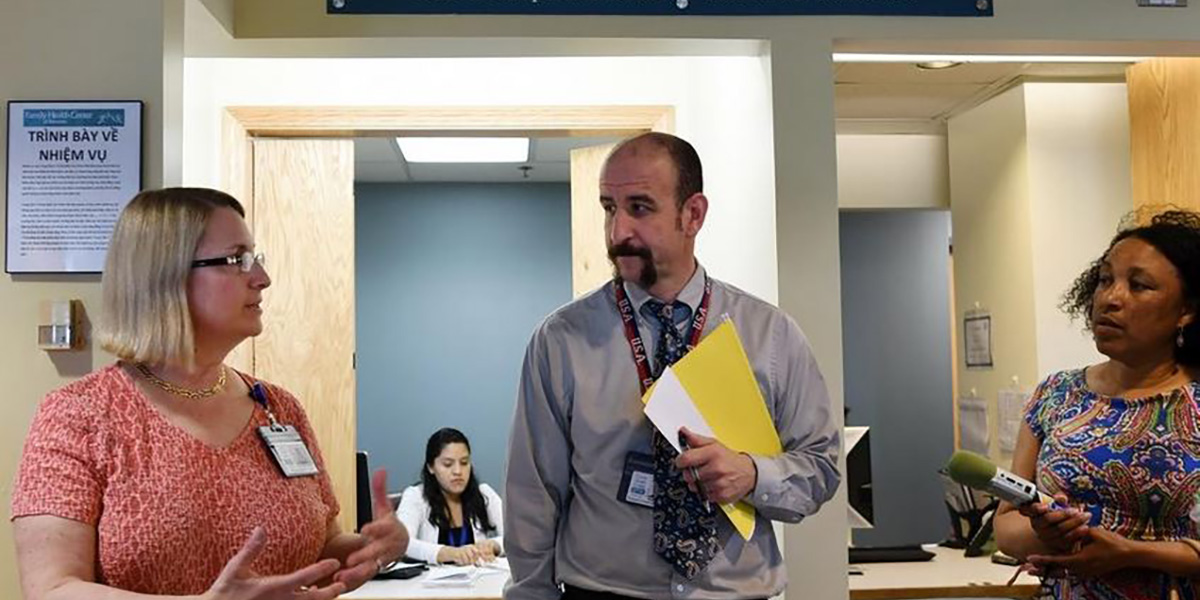WORCESTER – When Dr. Valerie Pietry, chief medical officer at Family Health Center of Worcester, started working with the organization 25 years ago, the community health center largely saw patients who spoke English, Spanish or Vietnamese. Now, nearly half of the 35,000 people it serves each year speak a language other than English – some 45 different languages at last count, including Arabic, Haitian-Creole, Urdu and Sango, a language spoken in the Central African Republic.
The diversity “makes us better,” Dr. Pietry said.
It also means that professional staff have to reach out broadly to provide care that people need and help them enroll in the right insurance program to pay for it.
Thursday afternoon, officials from the Massachusetts Health Connector, the state-based insurance marketplace, toured Family Health Center and discussed how to encourage even more Worcester-area residents to sign up. The connector helps families and individuals find affordable coverage, including some with subsidies.
Family Health Center is a certified navigator organization, one of eight in the state, which works with the connector to enroll members.
Nearly all patients at Family Health Center have income levels below 200 percent of the federal poverty level, and eight out of 10 live below the poverty level. Many are enrolled in MassHealth, the state’s Medicaid program for people with low income. For those whose income is above the maximum for MassHealth, but who still have trouble affording insurance, Family Health’s navigators can help people sign up for ConnectorCare.
More than 2,500 people were assisted with enrolling in a ConnectorCare plan at Family Health Center last year, according to Mohamed Fouzi Raheb, who supervises the health benefits advisers.
Residents can still access subsidized health insurance through special enrollment or the ConnectorCare program, even during this period when general enrollment is closed.
ConnectorCare members must be Massachusetts residents, be U.S. citizens or lawfully present in the U.S., not in jail, not eligible to enroll in an employer’s comprehensive health plan, and not qualified for Medicare, MassHealth or other public insurance.
ConnectorCare plans are available to people with incomes up to 300 percent of the poverty level, which is approximately $35,000 for an individual or $72,000 for a family of four. Lowest-cost premiums range from zero dollars to slightly more than $120 a month, depending on the level of plan benefits and member’s income.
“The nightmare for households is the deductible,” Mr. Raheb said about challenges that moderate-income families have with traditional health insurance. When people learn about ConnectorCare plans, which don’t have deductibles, it’s a big relief.
He said another big hurdle to get people to sign up is concern about immigration status. “They don’t know that they may qualify even without immigration status,” he said. “If you file taxes, you qualify.”
Health Connector officials said members must be lawfully in the country to be covered. But information gathered during the enrollment process is not shared with other agencies.
“We also see the young and invincible,” said Vicki Coates, Massachusetts Health Connector’s chief operating officer, referring to young adults who don’t think they need coverage.
Ms. Coates wanted to get the message out that “It’s easy, it’s affordable,” to sign up for coverage. People can enroll online or on the phone, or meet face to face with a navigator to complete the enrollment.
There are 260,000 members enrolled in the Massachusetts Health Connector statewide. Since the connector’s rollout a decade ago, Massachusetts has led the country in the percentage of residents covered by health insurance: 97 percent.
“It’s just the daunting part of how do I start?” Ms. Coates said.
That is where Family Health Center’s 12 staff interpreters and additional consultants can come in.
Karen P. Pinho, interpreter services program manager, said that staff go through certification and ongoing training. Cultural competency training is provided as well, because interpreting isn’t just about translating a language.
Mr. Raheb said Family Health’s navigators help people who are new to the area, new to the country and new to the health care system get over the hurdles to obtain, and renew annually, their coverage. The staff also go out to work with religious groups, youth centers and others in the community.
“It’s a human-to-human relationship we harvest every day,” he said.
Susan Spencer
Worcester Telegram & Gazette
